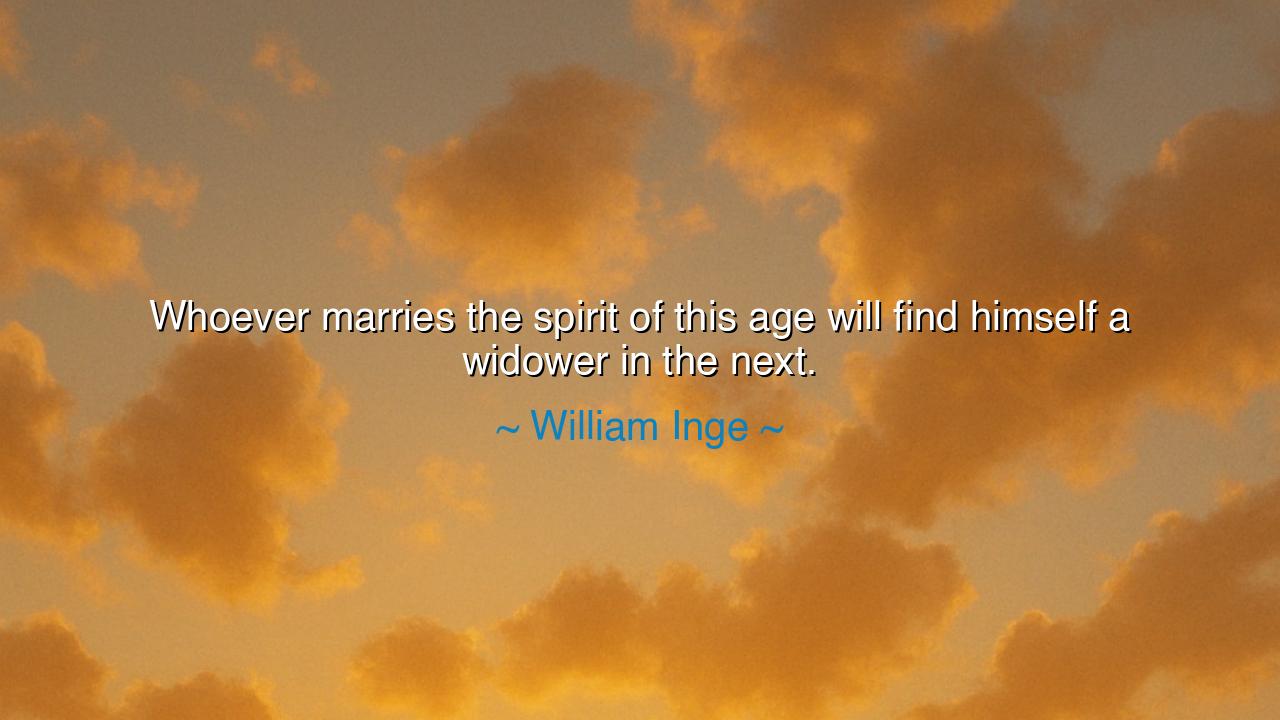
Whoever marries the spirit of this age will find himself a






The wise and reflective William Inge, a man who gazed deeply into the shifting tides of human thought, once declared: “Whoever marries the spirit of this age will find himself a widower in the next.” In this haunting and timeless warning, he speaks not of romance, but of allegiance — of how easily the soul can be seduced by the fashions and follies of its own time. His words remind us that every age, like a fleeting lover, is temporary; its values rise and fall, its truths fade into shadows. To cling too tightly to the beliefs and trends of the moment is to wed what is perishable. For when time moves on, and it always does, such a union leaves one bereft, lost, and alone among the ruins of yesterday’s certainties.
The origin of this quote lies in Inge’s lifelong meditations on morality, philosophy, and faith. A theologian and dean at St. Paul’s Cathedral in the early twentieth century, he witnessed the modern world tearing itself between progress and decay — between the promise of science and the loss of spiritual anchor. Inge saw clearly that societies often mistake the ideas of their moment for eternal truths. Yet every generation believes it has found enlightenment, only for the next to call it blindness. Thus, he warned: do not marry the spirit of the age, for time is a fickle spouse. What is celebrated today may be condemned tomorrow; what seems wise in one century may appear foolish in the next.
In these words lies the eternal tension between truth and trend. Truth is like the mountain — unmoving, enduring through the ages. But trend is like the wind — shifting, restless, full of noise and movement, yet leaving no lasting mark. The wise must learn to dwell upon the mountain, not to chase the wind. For those who give their hearts to the spirit of the times — to the fleeting values of popularity, fashion, or ideology — will find themselves orphans of meaning when the world changes its mind. The spirit of one age may cry out for freedom, the next for restraint; one exalts reason, another worships feeling. To build one’s soul upon such foundations is to build upon sand.
Consider the story of the Athenian philosopher Socrates, who lived in an age intoxicated by rhetoric and politics. The “spirit of his age” was one of persuasion, pride, and shifting truth — where popularity mattered more than virtue. Yet Socrates refused to bend to it. He did not “marry” the illusions of his time; instead, he sought eternal wisdom, asking questions that outlived the voices of the mob. For this, his city condemned him, but history has vindicated him. The Athenian democracy that silenced him is long gone, but his truth endures. Those who followed the fashions of that age vanished with it; those who sought the eternal found immortality.
The meaning of Inge’s teaching, therefore, is both moral and spiritual. He reminds us that the opinions of our era, however loud or noble they may seem, are not sacred. The spirit of the age is often blind to its own vanity. Every generation thinks itself wiser than those before, yet makes its own errors in new forms. To see clearly, one must stand apart from the fever of the moment, to listen for the still voice that whispers through all ages — the voice of conscience, of justice, of truth that does not decay with time.
His warning also carries a challenge for our own age, which moves faster than any before. We live in a time of ceaseless change — new technologies, new ideologies, new gods of convenience and self-worship. The spirit of this age demands constant adaptation, constant approval. But if we marry it — if we surrender our values to its fleeting trends — we risk losing our sense of self when its spirit passes away, as all spirits do. The wise must learn to move with time but not be possessed by it, to use progress as a tool but never as a master.
The lesson, then, is one of discernment and endurance. Seek what is lasting. Ask not what the world applauds today, but what will still be true when centuries have turned. Stand upon principles that do not rust with fashion — integrity, humility, and faith in what is good and eternal. Be courteous to the spirit of your age, but never its slave. Let your soul belong not to the shifting winds of opinion, but to the unchanging light that has guided the noble in every time.
Thus remember, O seeker of wisdom, the counsel of William Inge: every age offers temptations disguised as truth, every generation mistakes itself for the summit of progress. But those who build their lives upon what is timeless will never be widowed by time. The world will change, kingdoms will fall, ideas will fade — but the soul that weds itself to the eternal will remain unbroken, steadfast, and free.






AAdministratorAdministrator
Welcome, honored guests. Please leave a comment, we will respond soon